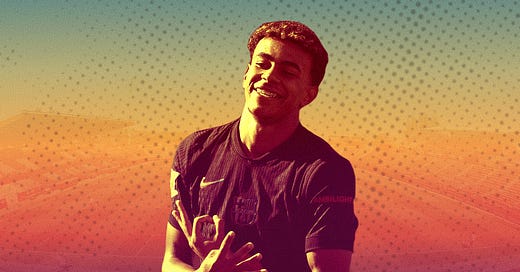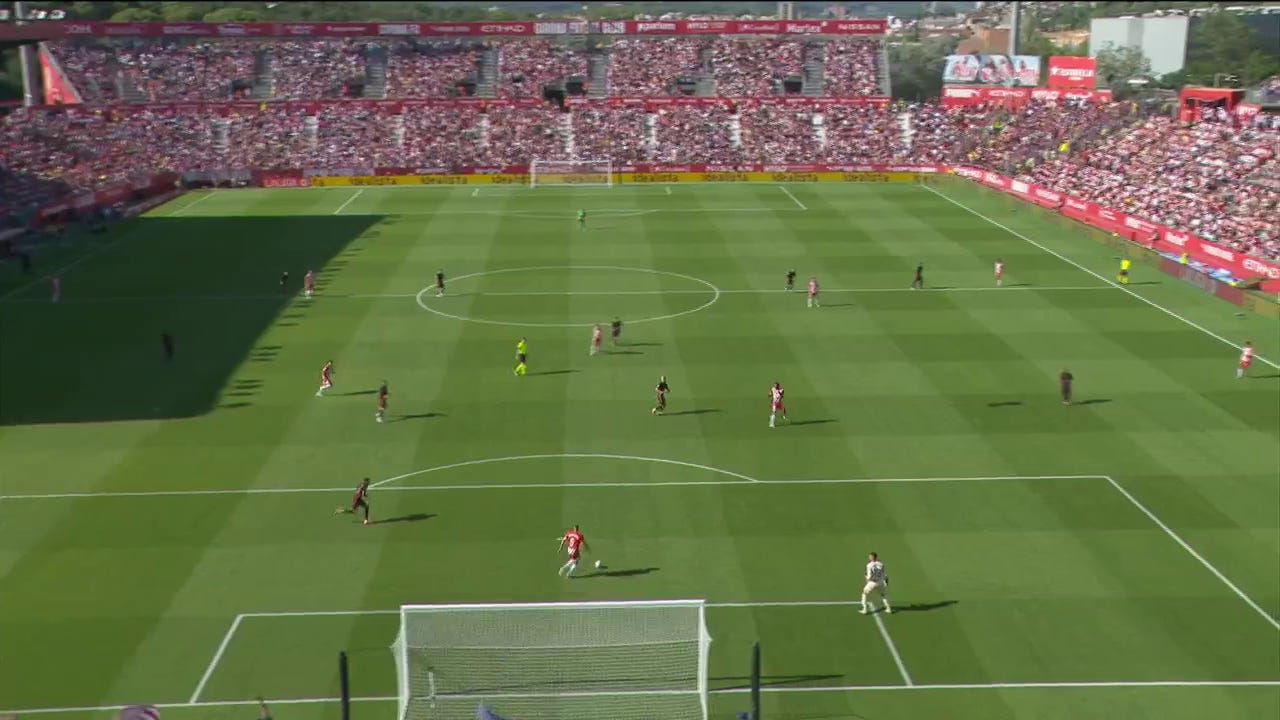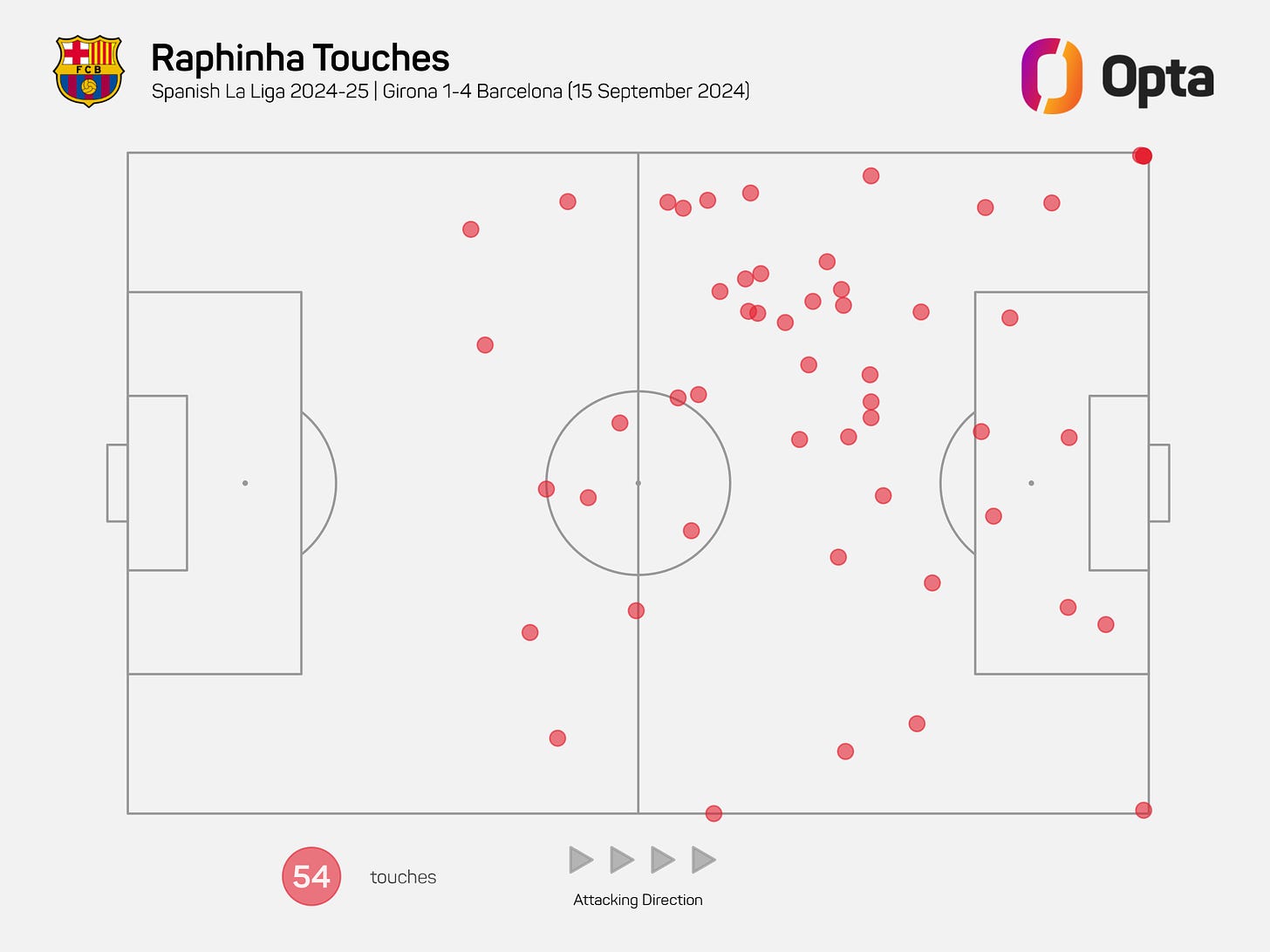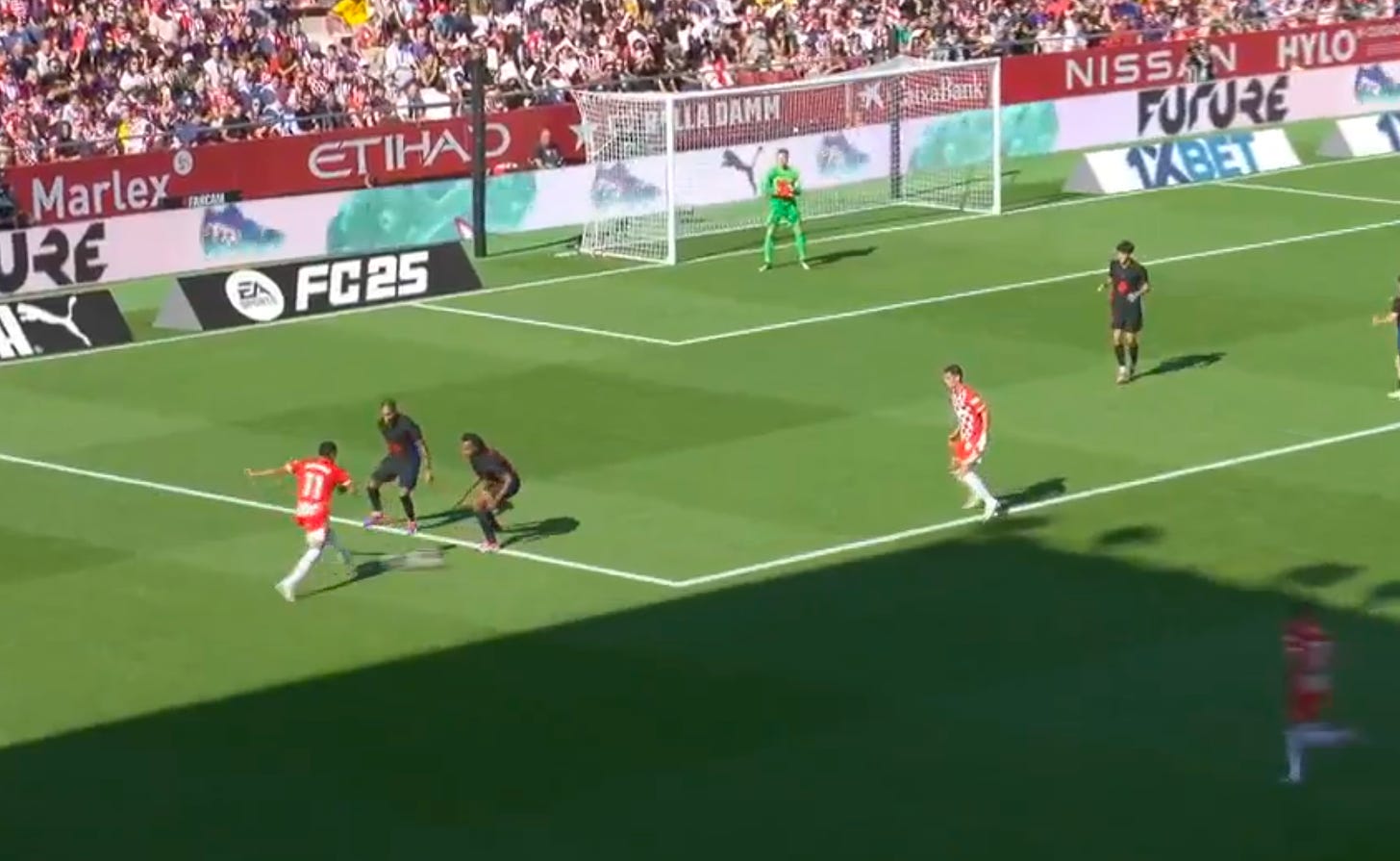The makings of Girona 1-4 Barcelona
Hansi Flick's side continued their 100% start to the season, dispatching a Girona side who have been formidable at Montilivi in recent times.
“Barça have shown us we’re far from their level,” was the way Girona boss Míchel summed things up after the game. Indeed, this wasn’t remotely similar to the two times his side faced Barcelona last term, when Girona won twice and scored a combined eight goals home and away.
Although perhaps a little fortunate to come out on top in both matches last term, the battles between Xavi and Míchel were characterised by two sides trading chances, and Girona showing they could land a punch of their own for every one they took. On Sunday afternoon, however, there was only one team swinging.
Here’s a look at some themes of how it all went down at Montilivi.
Lamine Yamal is a threat with and without the ball
The 17-year-old scored twice in the first half of this game, putting Girona in a hole from which they’d never escape. Even if his only contribution had been kicking the ball into the net (twice), it’d have been another statement showing from the youngster, demonstrating again that he has the punch and the game-changing ability that we very seldom see in a player of his age — and at this level.
While it’s been abundantly clear for a while that Lamine Yamal is going to be an extraordinary footballer, his latest trick that is now achieving a consensus of sort is that he’s pretty handy when it comes to winning the ball back.
‘Pressing’ is a wide-ranging term in football these days, and to say a player is good at pressing feels rather vague. There are many ways to do it, many calculations that have to be made, and differing mentalities and physical capacities that fuel the process. In Yamal’s particular type, he’s getting plenty of return for his efforts without exhausting himself. He prefers to work smarter, even when nobody can accuse him of not working hard.
The obvious example from Barcelona’s win at Girona came from his side’s opening goal, where Yamal himself creeps up on David López, tackles him from behind, and helps himself to a one-v-one with Paulo Gazzaniga. That curved run from out to in, blocking the immediate pass out to Daley Blind and guiding López out to the other side, was a theme that would bother Girona throughout.
Particularly notable in this game was Yamal’s ability to do multiple jobs in the pursuit of pressing, something all those considered ‘good’ in the art tend to have. In the example below, note the disguise on his amble out towards Daley Blind, before darting back to Miguel Gutierrez as soon as Gazzaniga would try his own disguised pass.
Later on in the second half, in a game that was already done and dusted by that point, Yamal is still attentive to opportunities where a short effort can bring plenty of return. After one of few successful occasions where Girona managed to play round Barcelona’s initial pressure, the home support’s cheers soon turn to groans when Yamal picks Jhon Solís’ pocket in midfield. Again, his disguised intention to make Solis think he was running with him as the ball ran across, quickly turns into a dart back to the other side.
The 17-year-old would end the game with six possession recoveries in the final third; the most by a player in a single game in LaLiga in 2024. With much made of his playing time, it’s good news for Barcelona that Yamal is no passenger without the ball, and can actually be a big asset, without running himself into the ground.
His intelligence doesn’t only belong to one half of the game.
JK
Barcelona’s pressure takes away Girona’s rhythm
If you want to stop a good team from playing good football, there are two main ways to achieve it. Either you limit the space for them to play in the opposition half, minimising their windows of attack, or you try to stop the ball getting there in the first place. Hansi Flick, quite clearly, belongs to the latter line of thinking.
Of course, great teams do both during the varying stages of games, including Barcelona. However, we know Flick will rebel against dropping back and ceding territory as long as he and his team can help it. In his short tenure, we’ve already seen the German bemoan the fact his team only pressed for most of the game, rather than all of it.
With slight tweaks given Girona’s use of three centre backs, we again saw plenty of Barcelona’s wingers leading the pressure from the front, with Lewandowski covering the immediate central area and/or David Lopez. In the lead up to the game’s opening goal, Girona found themselves squarely in the middle of that trap, having been forced onto one side of the pitch and then finding nothing but man-to-man markers.
Unlike other sides to have faced Girona this term, Barcelona and Flick didn’t seem to have a specific plan for Miguel Gutierrez – at least not the man-marking jobs we’ve seen from the likes of Atlético Madrid and Osasuna. At times, Jules Koundé stepped up to keep an eye on him. On others, Lewandowski and Dani Olmo were vigilant of blocking any easy passes into him.
For the visitors, hastening Girona’s passing and limiting their decision-making time was the key to it all. Here we see Lamine Yamal (that man again) having the smarts to prevent the pass to Miguel Gutierrez, while also controlling and harrying Daley Blind into a pass down the line that Girona weren’t prepared for.
Blind had averaged 8.5 progressive passes per 90 across the first four games in LaLiga this season. Against Barcelona, he made one.
Between the pressure on the ball and their high defensive line, Barcelona fuelled Girona’s doubts as to what they wanted to achieve in possession. Without a foothold in the game, they needed to keep it for longer. At the same time, keeping the ball alive and out of harm’s way was a challenge, which made playing forward all the more enticing.
“In the final third when we escaped the pressure, we finished our attacks too quick,” Michel later said. “We’re a team that needs to set up in the opposition half – in transition we suffer more. We didn’t want that transition game, we wanted more of the ball. They invite you to be more direct because of their high line.”
Overall, Barcelona recovered the ball an average of 52.3 metres from their own goal at Montilivi. That was their highest up the field in a league match since September 2022, in a home game against 10-man Elche. Needless to say, one of those tests is not like the other.
How long Hansi Flick’s side can keep their asphyxiating pressure up remains to be seen, but at this stage of the season nobody has been able to live with it — not even Girona.
JK
Centre of the pitch belongs to Barcelona, again
Where Barcelona made plenty of hay in forcing Girona onto one side of the pitch, swarming across, and trapping them there, it was difficult for the hosts to have any ideas of their own in achieving the same.
Flick’s side aren’t rushed, but they are — as the Spanish would say — vertical.
What we often saw against Girona was Barcelona keeping their opponents under the flame, showing the bravery and execution to play through them, rather than around. They weren’t in a rush to take up easy passes to free markers; those that go out to the touchline to an open player, which allow the opponent the chance to shift across while retaining their shape. Barcelona kept Girona on the move, with constant uncertainty between the lines.
In the move below, featuring Pedri, Dani Olmo, Raphinha and Lamine Yamal all in close proximity, Barcelona go from box-to-box exclusively through the middle of the pitch. Though the opposition may be well aware of their central attacks, knowing when they’ll form and which players will be involved is another thing.
Later on in the game, Barcelona put the icing on the cake with a goal stemming through
In constructing these central attacks, Barcelona have had great contributions from the likes of Pau Cubarsí and Iñigo Martínez, along with goalkeeper Marc-André ter Stegen when required. Particularly in the case of the former, Cubarsí has made the second-most progressive passes of any centre back in LaLiga this term (23), only behind Girona’s Daley Blind (35).
Even when it seemed like the hosts had been able to latch on to Barcelona and have them well covered with their pressure, that quality of pass from the back still found a way to save the day for the visitors. Where others might have submitted to a longer ball or a safer, clipped one down the line, Cubarsí’s zipped pass into the retreating Yamal quickly had Barcelona on their way to goal, after another set of dynamic central combinations.
Through their opening five games under Hansi Flick, 40% of Barcelona’s chances created — the pass or cross for a teammate that shoots — have come in the central third of the pitch. Indeed, they’ve also assisted more goals through the centre (5) than from either of the two flanks.
By now, all of Barcelona’s opponents will know of their speciality for attacking through the centre. In some ways, it might seem predictable. But when you can congregate the likes of Pedri, Dani Olmo and Lamine Yamal at close quarters, supported by movements beyond the defensive line, what tends to emerge has little to do with predictability.
JK
A far more Dynamic Barcelona
One of the things levelled at Xavi during his time in charge of Barça was that he didn’t have a plan, but the opposite was true. He was too rigid with where he wanted his players to be and it restricted them, made them much easier to defend against, and made moments of magic harder to come by when Barcelona weren’t having a good day. Stifled, the whole was far less than the sum of its parts.
Hansi Flick’s tactics allow for more improvistaion among players and more movement within the confines of his own specific plan.
Barcelona were criticised for splashing the small reserves of cash they had in the summer on Dani Olmo, but his role as the number 10 under Hansi Flick has made it look perfectly logical; not something that has been said about the club’s transfer business for some time.
To some extent, Olmo is the sun around which everything orbits. The midfield and attackers orient themselves based on where he is, or more often where he isn’t. In the clip from earlier, Olmo realises Girona have Barcelona penned in so he darts forward, only for both Raphinha and Yamal to occupy the space he has just left. It works, almost like an *ahem* lever.
It works to both drag defenders away and create space but also to bring his own teammates into the game. No longer is Lewandowski a spare part up front, cut off from his teammates for long spells. He is constantly interacting with them, while at the same time his non-penalty xG (0.85) hasn’t been this high in a season since he came to Spain. It’s a small sample size, but Flick looks the perfect antidote to Barcelona many ills.
Another player who has truly flourished under Flick is Raphinha.
The Brazilian has been popping up all over the place under the German and has been given the green light to drift inside, before taking sharp and quick turns up the field. Never a chalk-on-the-boots winger, this new-found freedom suits Raphinha much better — to the point where’s it’s really difficult to explictly define his role.
His 54 touches against Girona came all over the field. He plays as a left midfielder and often switches to the right to combine with Yamal and Olmo, and then drive into the box for a ball over the top. He plays as an interior at times and is often dropping deeper to free Pedri up to explore the spaces between opposition defensive and midfield lines.
That’s not to say it always works. In the image below, Raphinha had found himself as one of the interiors when Girona attacked (swapping with Olmo), and gets pulled into a defensive situation he almost makes a mess of. Some quicker thinking from Miguel Gutierrez, a one-two with Danjuma, and Barcelona were in serious trouble. But more often than not, Barcelona were on the front foot, attacking after counter-presses and thus rarely pinned back by the hosts. It’s a relatively minor price to pay for such dynamism and a trade-off Flick is willing to accept.
RD
Where do Girona go from here?
There has been some consternation over Girona’s start to the season. They are currently eighth in La Liga on seven points, after a summer with more arrivals and departures than Girona–Costa Brava Airport might not see during the peak of summer travel.
Aside from the quanity of departures, the stature of some of those who left simply can’t be replaced. Quite literally in some cases. A simple option if this game was played last season would have been to go long to Artem Dovbyk, with the very presence of the Ukrainian meaning Barcelona’s press could be bypassed. Indeed, Girona’s 4-2 win at Montjuïc last season was greatly aided by Dovbyk’s hold-up play, with Míchel later explaining they’d used him as a way to get their midfielders on the ball facing forward (after securing passes, holding off defenders, and finding a teammate).
Savinho is another player who needed a tailored plan to stop. Arnau Danjuma might end up being a pretty decent replica of the Brazilian, but he looks like he could be a better option as either the left winger or as a second striker for Míchel this season.
To bring this back to where we started and the quote from Michel:
“Barça have shown us we’re far from their level.”
Last season was not normal for Girona. They over-achieved and while their football was scintillating, brave and audatious, the idea of them repeating that was always folly. But that’s not to say the face they showed us against Barcelona is all there is to see from them.
Ladislav Krejci, Donny van de Beek, Gabriel Misehouy, Yaser Asprilla and Bojan Miovski were all on the bench on Sunday and only a couple of them saw minutes. None of them have made a true impact yet this season.
The weight of expectation is resting heaving on Girona’s shoulders but in a few short weeks, those expectations will have grown smaller and Michel can get back to reinventing a team that is in need of refreshing.
RD
















